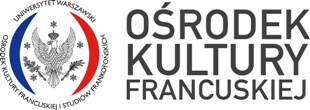Le mardi géopolitique du 19/01/2021

Le Centre de civilisation française et d’études francophones, la Faculté de sciences politiques et d’études internationales de l’Université de Varsovie et le Groupe d’études géopolitiques vous invitent à la rencontre dans le cadre du séminaire MARDIS GÉOPOLITIQUES.
Geopolitics of contemporary Belarus: a SWOT analysis
dr Anaïs Marin (CCFEF, Université de Varsovie)
le mardi 19/01/2021
15h00 – 16h30
Le séminaire aura lieu en ligne : https://meet.google.com/nds-xtyx-zrf
La rencontre se tiendra en anglais.
Abstract
What is the relationship between territory and politics in and around the Republic of Belarus? This question will be addressed by analysing the domestic strengths and weaknesses that determine the country’s foreign policy options, as well as the external opportunities and security threats that constrain its foreign policy choices (SWOT). The lecture will overview the historical building-stones of Belarusian statehood and the challenges it faces in terms of nation-building and sovereignty-consolidation in the post-Soviet era. The analysis will focus on the international dimensions of A. Lukashenka’s authoritarian regime-survival strategy, which builds on “situational neutrality” in international affairs, selective reintegration along the Russian-Eurasian vector, and “dictaplomatic bargaining” between Moscow and the West. These conceptual tools will help students understand the (geo)political developments that unfolded in 2020, and build scenarios for exploring what the future holds for Belarus.
Bio
Dr Anaïs Marin is a French political scientist specialized in IR, Eurasian, and border studies. Her current research, funded by a 3-year Opus grant from the Polish National Science Centre (NCN), focuses on Russia’s “sharp power” strategies towards its Western European neighbours and their percolating effect on democratic values and EU institutions. Dr Marin previously analysed the “dictaplomacy” of authoritarian post-Soviet Eurasian regimes, in the framework of a Marie Curie fellowship. As a Belarus expert, she has worked with several think tanks, such as the Finnish Institute of International Affairs (FIIA, Helsinki), the Centre for Eastern Studies (OSW, Warsaw), the EU Institute for Security Studies (EUISS, Paris) and recently Chatham House (London), of which she is an Associate Fellow. She contributed policy papers and recommendations to various EU governments and institutions, while also regularly taking part in OSCE/ODIHR election observation missions in the region. Since November 2018 she holds the pro bono mandate of UN Special Rapporteur on the situation of human rights in Belarus.
